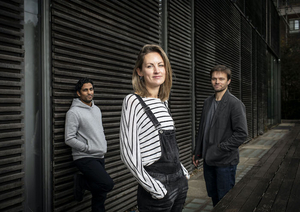Interview: Director Alice Hamilton Talks THE DUMB WAITER at Hampstead Theatre
What is it like taking on Harold Pinter's iconic play in the Covid age?

The Dumb Waiter actors
Shane Zaza and Alec Newman
Alice Hamilton's directing work includes the Olivier-nominated Every Day I Make Greatness Happen at the Hampstead Theatre,The Weatherman at Park Theatre and While We're Here at the Bush Theatre.
She's now back at the Hampstead to helm Harold Pinter's The Dumb Waiter, which premiered here 60 years ago.
Do you remember any early productions that inspired your love of theatre?
Some of my most memorable theatrical experiences growing up were in the Salberg Studio at Salisbury Playhouse. I remember being very strongly affected by a production of Martin McDonagh's The Beauty Queen of Leenane - the audience were seated on kitchen chairs around the edge of the acting space, and the immediate brutality of it was shattering.
Another brilliantly intimate and uncomfortable production that made a big impression on me was Franz Xaver Kroetz' Through The Leaves at Southwark Playhouse - an extraordinary social realist study of human frailty.
When did you make a conscious decision to pursue directing as a career, and did you have any role models or guidance on how to go about it?
I attended a brilliant youth theatre which was probably the decisive factor - it became clear to me there that I wasn't very good at acting, but that there was this other job that I really liked the look of. We had a formidable director who commanded total respect from a troupe of teenagers, and she became a sort of role model and reference point for what I wanted to be.
Tell us a bit about your fantastic creative partnership with Barney Norris - what do you love about his work, and how does it fuel you as a director?
I think it helps that we grew up in the same town and attended the same youth theatre - we have shared reference points, and have developed a shorthand that means we can easily understand and feed off each other. Barney's work is always very rooted in place and is also very character-driven, which is exciting to me. I think we thrive on the same kind of dramatic stimuli - we are both basically interested in stories that are concerned with the business of being human and the way that 'ordinary' lives can seem extraordinary.
You've spoken about the idea of 'Quietism' - shining a light on forgotten communities, often rural. Do you think there are still underrepresented voices in theatre?
I think there is great effort being made in many quarters to try to expand and diversify the dramatic conversation, but there are definitely voices that are getting left further and further behind. As far as rural communities are concerned, I think that sadly we have become more polarised than ever, which means there is an even greater gap between what is happening in the countryside and what is being seen on London's stages.
Brexit has impoverished debate so that there is now less nuance in the way we think about the country, and less openness in terms of what stories theatre-makers are telling. Theatre has struggled for a long time to incorporate 'ordinary' rural lives into progressive politics, but the reductive assimilation of 'countryside' with 'UKIP' resulting from the referendum means that these voices have now been effectively silenced.
As a new-writing director who beautifully serves the plays you helm, is it harder to establish yourself in terms of your own style or voice?
Yes, I suppose I become more defined by the sorts of plays I choose to direct rather than any particular style that I bring. I'd like to think that might add up to some kind of coherent aesthetic - but it's certainly always important to me that it is the writer's voice we are hearing and not mine.
Going from new writing to Pinter is a really interesting shift. What made you interested in tackling The Dumb Waiter?
The challenge of it, I think! I've never worked on anything that is so rhythmically and formally precise, and I've had to adopt a much more technical approach than I normally would. It's rather like a piece of music: you have to learn all the beats and phrases before you can begin to understand what it is.
Do you tend to research heavily, and look back at past productions, or try to start fresh?
This is in fact the first play I have directed that has had more than a single previous professional production (other than an extremely loose adaptation of Blood Wedding), so the idea of looking back at archives has never really arisen. But I think it is important to treat everything as a new play. For me, it's always just about trying to get to the heart of what the writer was intending and put that on the stage, regardless of what may or may not have gone before.

How have the Covid safety measures, social distancing and the two lockdowns impacted on the logistics of developing the show?
Well, it's certainly been different... It's taken a huge amount of logistical planning from the theatre to get us to a place where we can safely return to the building, and then it's been a case of factoring all the new protocols into our rehearsal regime, which of course takes some getting used to! I think we've all just had to become much more adaptable - prepared to revise schedules to work around Covid testing, or reconfigure the whole timeline to accommodate last-minute lockdowns.
Tell us a bit about your cast, Alec Newman and Shane Zaza, and some of the ideas you've all brought to this revival
They're both wonderful actors, and have embraced all the new Covid-related irregularities and uncertainties with great spirit and intrepidity! They have a great chemistry onstage together, and we've really enjoyed exploring what the relationship and shared backstory of these characters might be from the very sketchy clues that Pinter gives us. I hope that together we have found a kind of playfulness and humanity that sits within his tightly crafted framework of ambiguity.
How do you think the play will speak to audiences now, 60 years after its original run at the Hampstead? (And perhaps particularly in our current strange context!)
It has been quite strange to realise just how resonant this play has suddenly become, with its focus on restless confinement and creeping unspecified external threat... It feels so apt a response to the current moment that it's hard to imagine it was programmed before the pandemic was even thought of! Pinter's plays leave so much space for audience interpretation - they are so fundamentally elastic and deliberately oblique - that they will always be readily viewed through the prism of the moment. We've set this production in the period in which it was written, but I think audiences will find it feels startlingly present.
Is it exciting to direct for the main space, following your Hampstead Downstairs shows?
Yes - I love working at this theatre, and it feels particularly special to be given the anniversary production of this great play for my first foray into the main space.
What/who is still on your directing bucket list?
I'd be keen to continue my explorations away from new writing and have a chance to delve into some of the other great plays of the 20th century. There are some wonderful Irish plays I'd love to direct - a Brian Friel or Sean O'Casey, for example. And I've always longed to do an Arthur Miller. But with the current state of things, I'd probably take whatever I can get...!
How has Covid impacted you as a freelance director, and have you been able to benefit from government or industry support schemes? Do you think the right - or enough - support is in place?
I was fortunate in that lockdown struck after an unusually fertile period, which kept me afloat for a bit alongside what I could claim from the government self-employment scheme. I know there are many who fell through the cracks of the government support packages, and for them this has been a much more difficult time.
I think it's the uncertainty of the future that's most concerning. At least in the short term (and possibly beyond), we're going to see a massive contraction in opportunities for freelancers as theatres struggle to get back on their feet. In an industry where many struggle to make ends meet in a good year, that is a big worry.
What changes would you love to see in theatre as we emerge from this crisis?
I think there is room for more kindness in the theatre. We've all been in this crisis together and shared this feeling of absence - perhaps there is an opportunity now to move forward with more empathy and greater willingness to listen to other voices.
Finally, why should audiences come see The Dumb Waiter?
It's a chance to emerge from this moment of cultural starvation and experience the immediacy and collective thrill of live theatre again!
The Dumb Waiter is at the Hampstead Theatre 3 December-16 January, 2021
Photo credit: Helen Maybanks
Comments
Videos

